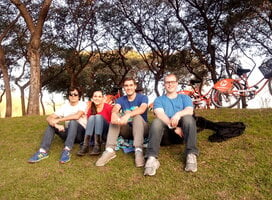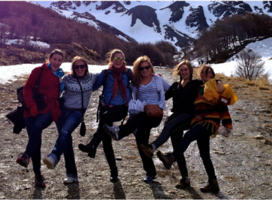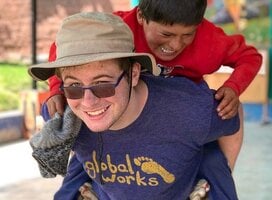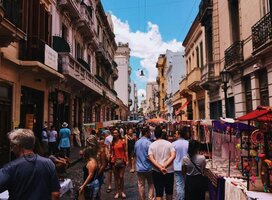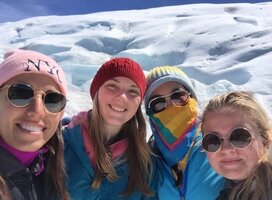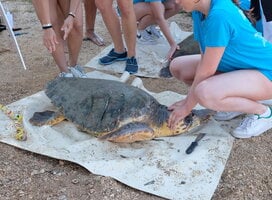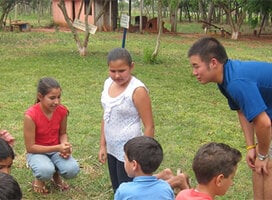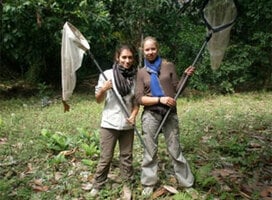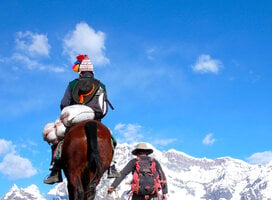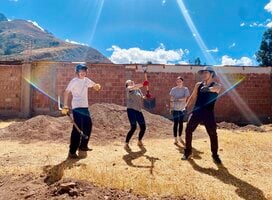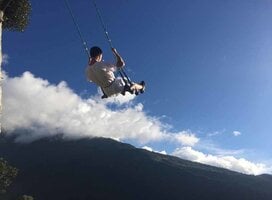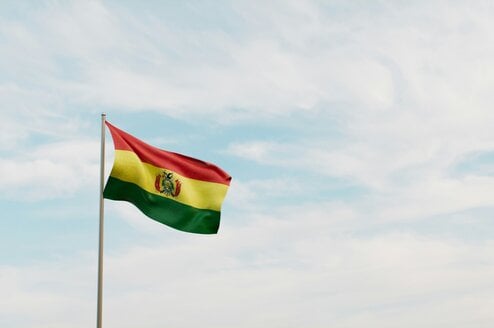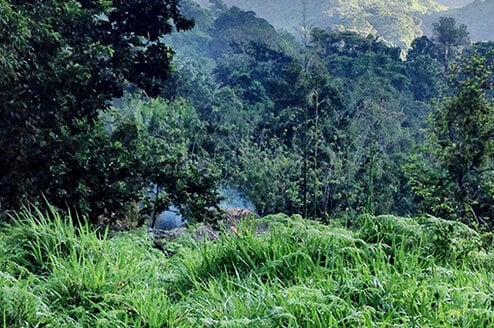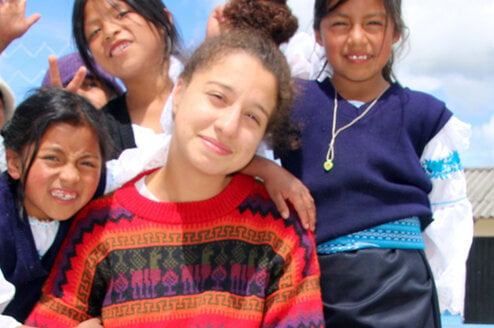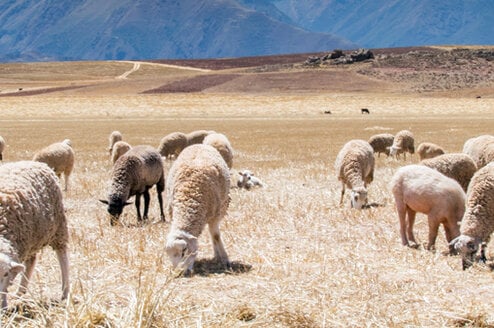High School Abroad in Argentina
As the second largest country in South America, Argentina has a lot worth seeing. Lively Buenos Aires is the birthplace of tango, while breathtaking Ushuaia - dubbed "the End of the World" - is one of the southernmost cities in the world and everything from the majestic Andes Mountains to the vast Pampas grasslands lies in between.
High school students will find no scarcity of destinations or experiences to uncover in Argentina. As a student abroad in Argentina, you’ll have the opportunity to learn a new language, live with a host family, volunteer, and -- if you choose the right program -- even earn college credit.
Argentina is great for students who are interested in: Learning a new language, volunteering, experiencing a unique culture, eating fabulous food, making new friends
Students interested in studying in Argentina can choose from:
- A semester or full year exchange
- A summer study abroad program
- A study / travel program over spring, winter, or summer break
High School Exchange
Student exchange programs in Argentina can last for a year, trimester, or semester. Classes are taught at local high schools, meaning they'll be led in Spanish and you may be required to meet basic (or advanced) Spanish proficiency requirements.
These types of programs generally have designated points of contact at the school in case you have questions while in the country. They may organize orientation, help with your class schedule and arrange meet ups for you and other participants. Often, high school exchange programs in Argentina can lead to a direct carry-over of credits with your high school back home.
Summer Study Program
High school students whose free time is limited to their summer break will find a variety of summer programs in Argentina to suit their interests. Spanning between two weeks to few months, students are able to focus on learning Spanish and immersing themselves in Argentinian culture.
Universities have been known to partner with summer programs so students can receive college credit. If you’re looking to get ahead on your college education while still in high school, this is a great opportunity!
Youth Travel Tours
High school students who only have a few weeks at most to spend in Argentina, or whose Spanish isn't up to par enough for a full semester, can look into teen travel tours. Trips are thoroughly planned so students get the most out of their time abroad, often studying Spanish, sightseeing at historical attractions and learning about Argentinian culture.
Tours can have various themes such as community service, ranch work, environmental conservation, adventure or cooking.
Student Visa
Visa requirements for Argentina differ depending on what kind of visa you are interested in and what country you’re from. If you’re from the United States, Canada, Australia, or the UK and are planning to stay longer than 90 days, you will need to obtain a student visa. You must provide an acceptance letter from your school in Argentina, proof of financial stability and a criminal background check with your application.
High school students traveling with a program are normally provided assistance with visa applications (though, as these programs are typically a couple of weeks long at most, you'll be able to enter on a tourist visa).
Housing
The program you select will determine your housing options while in Argentina. Homestays are commonplace for summer, semester, and yearlong high school exchanges. This allows students to become a part of a local family and immerse themselves in the resident culture. Teen travel programs frequently provide participants with shared hotel rooms or hostels -- though these programs might also have students staying in a homestay for a day or two.
Finances
If you’re traveling from North America to Buenos Aires, flights can cost between $850 - $1,200 USD range, while those coming from Europe can pay $650 to $800.
Inflation is on the rise in Argentina and it’s not as inexpensive as it once was. Costs for transportation, food, nights out, and additional expenses are nearly on par with countries like the United States and Canada. Students should budget about $35 USD a day for personal expenses.
Program costs in Argentina fluctuate depending on type of housing, length of stay and included amenities. It can range from $2,000 for a summer program to $11,000 for a year-long exchange.
Packing Tips
Packing for Argentina really depends on where you’ll be and what time of year you’re going. The winter months (June, July, August) can be chilly to mild while the summer months (December, January, February) do get hot. Considering Argentina’s land span, visiting regions farther north, and closer to the equator, will be overall warmer than staying in southern locations. Moving from north to south, Argentina’s climate regions change from tropical to temperate to arid to cold.
Summer
- Breathable and UPF (sun resistant) clothing
- Swimsuit
- Sunscreen and insect repellent
- A hat
Winter
- Warm/waterproof jacket
- Layers
Always
- Solid walking shoes for outdoor adventures
- A power and voltage converter
Health
Traces of the Zika virus have been found in Argentina. To learn more about Zika and how to avoid getting infected, read the Washington Post's article on Zika precautions.
It is recommended that travelers obtain hepatitis, yellow fever, typhoid, tetanus, and rabies vaccinations before traveling to Argentina. Mosquitos in Argentina can transmit diseases like Yellow Fever and Dengue Fever. Students are encouraged to take proper precautions by researching high-risk areas before traveling, using bug repellant and covering their skin.
Stay away from animals you don’t know in Argentina as they may carry rabies. Only drink bottled water and ensure that your food is properly and completely cooked. Traveler’s diarrhea is common, especially when first arriving to a new country, so stay hydrated and see a health professional if symptoms don’t abate after a week.
Safety
High school students traveling in Argentina shouldn't have any major safety issues if they follow general safety guidelines. Some basic tips to help (and not scare!) you are below:
In Argentina, it's particularly important to be aware of your surroundings, as pickpockets, snatch-and-grab thieves and criminals working in pairs to distract targets have been reported. If you're in a crowded tourist destination keep your valuables close. Perhaps leave the valuables home altogether, as they often go missing from checked bags arriving at the Buenos Aires airport (but if you don't, never pack electronics in your checked bag. Keep them in your carry-on).
Common tricks of thieves in Argentina include vendors and taxi drivers offering to exchange counterfeit “bad” bills for “good” ones. Seemingly friendly strangers may attempt to draw you into a bar offering a free show or discount, but once inside you are forced to pay an exorbitant amount for a drink before being allowed to leave.
Stay alert when using ATMs as thieves are known to target individuals making withdrawals. “Express kidnappings” have also occurred where a person is taken to ATMs and forced to withdrawal all cash possible, then a friend or family member is told to meet the kidnapper and victim with all the money they can obtain to complete the exchange.
Virtual kidnappings are also growing in number. This is when criminals steal an individual’s phone and call family members claiming to have kidnapped the phone owner and demand a ransom fee. If your phone is stolen, be sure to contact friends and family immediately to let them know you are safe and remind them they could be subject to this scam.
Avoid local demonstrations and grab a friend if you’re walking somewhere at night. Agree upon a price in the local currency before getting into a taxi as overcharging and occasionally kidnapping having been known to happen in larger cities. Always follow local government laws and stay away from illegal drugs and underage consumption.

